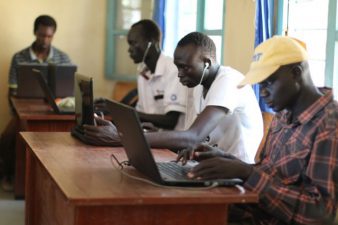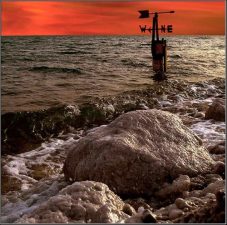 Care about alternative energy and an oil-free future? Then you might want to meet Prof. Doron Aurbach who is working to “green” the battery industry, making better, long-lasting batteries to store clean power. He’s now collaborating with LG on a new magnesium battery.
Care about alternative energy and an oil-free future? Then you might want to meet Prof. Doron Aurbach who is working to “green” the battery industry, making better, long-lasting batteries to store clean power. He’s now collaborating with LG on a new magnesium battery.
He developed the first rechargeable lithium battery, and now Prof. Aurbach and his team of 35 may develop the first rechargeable magnesium battery.
The story of Israel’s most prominent battery researcher has a shaky beginning. Prof. Doron Aurbach’s parents both pulled themselves from the ashes of Nazi death camps to cobble together a new life in Israel. Into their first son Doron they poured their own lost education, their hopes and their dreams.
Born in 1952 and raised in Ramat Gan, outside Tel Aviv, Israel’s most well-known battery scientist has more than lived up to his parent’s expectations.
Aurbach is now working on what may be the world’s first rechargeable magnesium battery, which could answer the need for battery storage systems in solar energy collectors.
His previous research led to knowledge about the fundamental basics of lithium and lithium-ion batteries, and if the timing had only been right, he might have been a millionaire by now, for developing the technology behind the world’s first rechargeable lithium battery. The company he was working for – Tadiran – simply chose the wrong market.
The chemistry of life
Aurbach enjoyed a happy childhood and was active in the local Scouts, he tells ISRAEL21c. At an early age he was interested in science, and as the eldest, his parents, who, “coming from Poland, really saw hell, put their ambitions in me. Even though I have a sister and a brother, I was the oldest so they invested a lot of effort in my education and pushed me to pursue useful things.”
During four years of military service Aurbach was an officer in a combat infantry unit and took part in the Yom Kippur War in1973. He later visited the combat zone after Israel and Egypt signed a peace treaty. Then, after starting his studies, this father of seven and grandfather to 16 found religion.
It was his early studies in chemistry and its “complicated nature” that started him thinking about the “chemistry of life.” Through science, he discovered his truth in Judaism and become religiously observant, despite his secular upbringing.
Currently residing in Tel Aviv’s ultra-orthodox Bnei Brak neighborhood, Aurbach enjoys the fact that he can hop on his bicycle and be at work at the Department of Chemistry lab at Bar Ilan University within five minutes. He has been a full professor at the university since 1996. Under his supervision, a team of 35 are working to make better batteries. Many hail from the former Soviet Union and are a boost to Israel’s science community, Aurbuch says.
His laboratory specializes in novel devices for energy storage and conversion, rechargeable lithium and Li-ion batteries and super (EDL) capacitors as well as rechargeable magnesium batteries and new materials in battery development.
No time to waste
“I don’t waste time in traffic,” he asserts. “…I look for quality of life. Some people may want to live in the country with gardens, but they are using their time poorly. My house may be less fancy, but I am at work within five minutes, and it’s very helpful to live so close to the university, especially when there’s an emergency at the lab.”
By 1983 Aurbach had earned an M.Sc. and Ph.D. from Bar-Ilan University in Physical-Organic Chemistry. Between 1983 and 1985 he studied and conducted research under the then top battery researcher Prof. E.B. Yeager at Case Western Reserve University in Cleveland.
“I had to start from scratch with lithium batteries – at a time when the world started to show interest in these batteries, but the group didn’t yet deal with it,” he tells ISRAEL21c. “They called me because of my background organic chemistry. They needed organic solvents for lithium batteries.”
It was his time at Case that gave Aurbach the model for an Israeli battery lab: “We are inspired by the academic system in the US. It’s something very honest, and relatively clean of politics and the level is high.
“I think the US is still the leader in terms of good science,” says Aurbach, who has written 335 journal papers, owns 12 patents, has penned a book on electrochemistry, physical chemistry and surface/material science, in addition to having published nine chapters in various science books.
Fueling the research in the field
While Israel is not known for its huge successes in battery science, Aurbach is fueling the basic research in the field. “We brought a lot of understanding in how systems work – how to stabilize electrodes, the main factors that influence performance; what materials may be more or less important.
“We’ve developed very systematic studies to map materials, to map reactions, we’ve mapped problems, we’ve mapped advantages and we’ve studied a very broad spectrum of materials,” he says. “I cannot say Israel is a place for big commercial ventures, but in terms of understanding and contributing to basic science, it is.”
Aurbach’s current focus is on rechargeable magnesium batteries. “We were able to develop one from scratch and demonstrate systems which work,” he says. Important for its application is the ability of the battery to hold thousands of cycles, or refills, especially if it is to have applications in sustainable energy projects. “You want to put in a system for 10 or 20 years, to close it and forget about it,” he explains.
Now he’s collaborating with LG on the battery. Magnesium is a safer battery to use than lithium as it is less reactive and the material is abundant. It also has the potential to store a huge amount of energy. It will charge during the day and release energy at night when the sun is down, and it should last for more than 4,000 cycles.
Aurbach is also looking into electrostatic reactions and the charging of super-capacitors – batteries whose storage is based not on chemistry but on electrostatic charges – like the ones you get from the doorknob in the winter. This science also has applications in the desalination of water.
(This story first appeared on ISRAEL21c – www.israel21c.org)




5 thoughts on “Meet Doron Aurbach, Israel's Energizer”
Comments are closed.